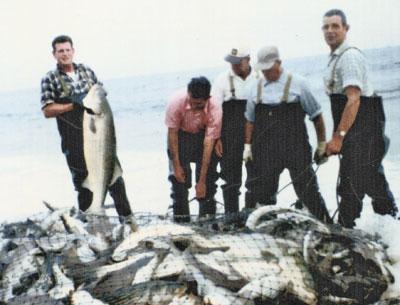The Great Injustice of ’92

Driving down Bluff Road in Amagansett on the sunny morning of July 28, 1992, I looked up and watched an osprey flying landward with a small striped bass in its talons.
I was en route to the protest of a new state law that banned the ocean seine as a means of catching striped bass. The regulation capped a decades-long effort on the part of powerful sportfishing interests, in cooperation with UpIsland politicians, to cripple the East End’s inshore commercial bass fishery.
Billy Joel, whose hit “Downeaster Alexa” told the story of a bayman regulated out of the bass fishery, was arrested by state police after taking possession of bass from an ocean seine hauled ashore by Dan King’s dory crew. Then-Town Supervisor Tony Bullock was arrested too. Larry Cantwell, the East Hampton Village administrator at the time, and the current town supervisor, also participated in the protest.
“This stinks out loud. This situation is a product of rank politics and corruption,” Supervisor Bullock said. He was right.
The following evening, Joe Pintauro’s play “Men’s Lives,” a loose adaptation of Peter Matthiessen’s book of the same name, premiered at the Bay Street Theatre in Sag Harbor. The title of book and play was taken from Sir Walter Scott’s “The Antiquary”: “It’s no fish ye’re buyin’ it’s men’s lives.” The play was reprised two years ago on the 20th anniversary of the haul seine ban and the protest that followed.
I reported on what came to be known as the bass wars for The Star starting in 1985 and for the next decade. Since then I’ve written about that day in July 22 years ago a number of times. It’s a part of local history that should not be forgotten.
A great injustice was done to a proud segment of our community. But there was an even greater injustice, in my opinion. That’s why I mentioned seeing the osprey that morning. It was, and is, an image of nature’s give and take, of balance, and the goal of sustainability.
The ocean seine was banned in the name of “conservation,” but conservation had nothing to do with it. The word had lost all meaning. The ban on ocean seines codified the erroneous belief that the nets of baymen, inshore market fishermen themselves, were responsible for overfishing the striped bass resource.
The perception that grew from the law hid the truth that a far greater share of the striped bass resource was being killed by recreational fishermen, a fact that Michael Crocker, author of “Sharing the Ocean: Stories of Science, Politics, and Ownership From America’s Oldest Industry,” pointed out in his opinion piece that appeared in The New York Times last Saturday.
Crocker was bemoaning the shortsightedness — no, let’s call it what it is — the greed that grows from a fisherman’s simple desire to feel the tug of a bass on his line, out of control when capitalized in hands of industry lobbyists.
It seems the same is true no matter what the finite resource. We are a selfish species, not individually perhaps, but things go awry whenever Huck Finn goes corporate, when natural appetites grow price tags. “When the going gets weird, the weird turn pro,” in the immortal words of Hunter S. Thompson.
The point is, if the coastwide population of striped bass is declining, as Crocker states, sportfishermen should take personal responsibility — catch fewer fish. Remember, unless you’re a guide or charter captain, you are not making a living at it, so ease up. Don’t leave it to your industry representatives to turn conservation into a political pissing contest.
Speaking of making a living at it, on Saturday, Long Island Traditions is hosting an outing with veteran market fishermen and their shoreside support on the first of a series of guided cruises that explore the waterways of Long Island.
The boat trips feature storytelling, poetry, and music. The Viking Superstar will leave Montauk’s Viking Dock at 4 p.m. on Saturday and return at 7 p.m. On board will be Chris Wright of New Bedford, Mass., a scalloper, Chip Duryea of the Perry B. Duryea and Son lobster company of Montauk, and Dave Krusa, also from Montauk. Captain Krusa, who started his career digging clams and went on to pioneer offshore lobster and tilefish fisheries, will read from his writings drawn from his lifelong career at sea.
The cost of Saturday’s voyage is $40 per adult, $20 for kids under 16.
